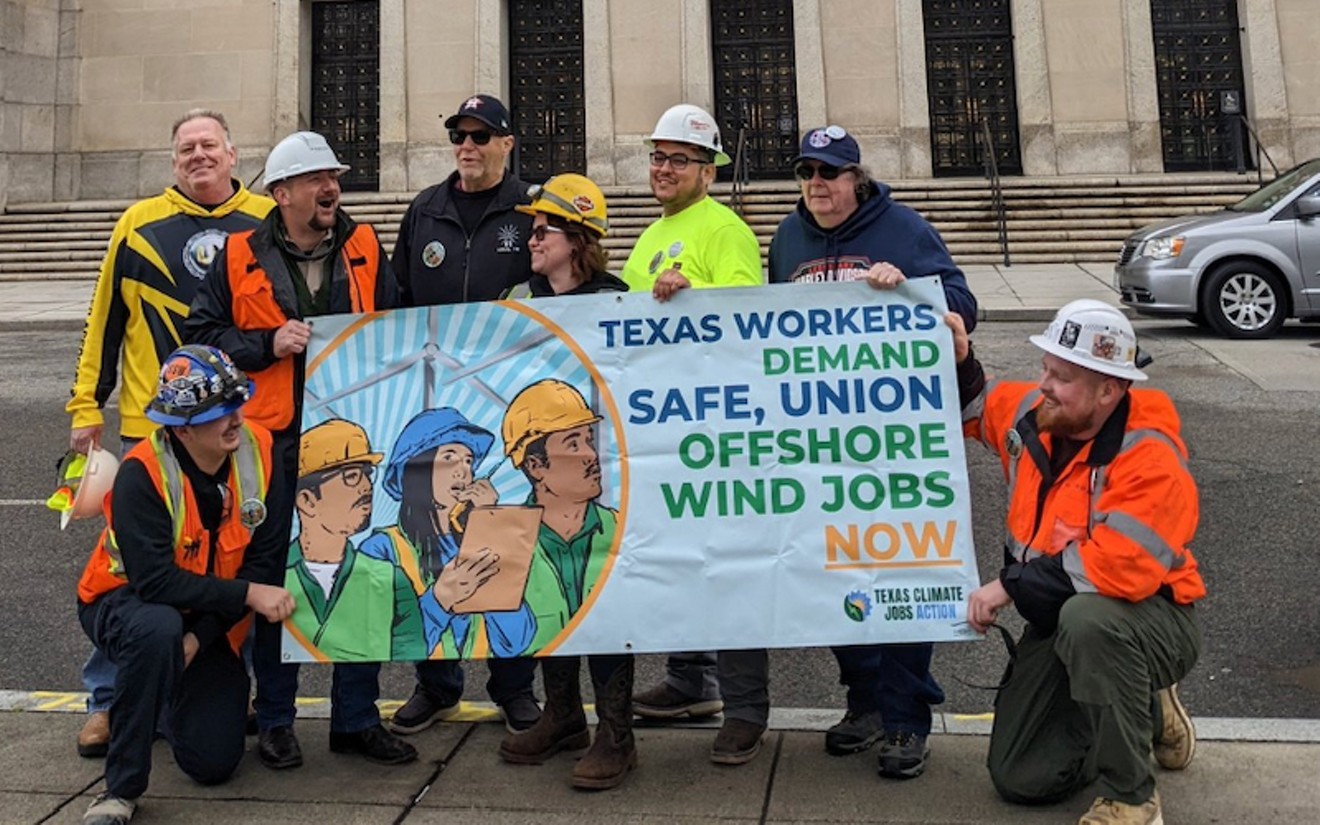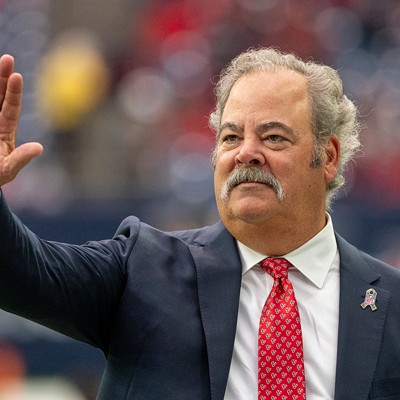Support Us
Houston's independent source of
local news and culture
account
- Welcome,
Insider - Login
- My Account
- My Newsletters
- Contribute
- Contact Us
- Sign out
Local Unions Call for Safe Jobs in Offshore Wind Energy Industry
Faith Bugenhagen March 31, 2023 4:00AM

Gulf Shore union members are advocating for the creation of worker safety and security measures on future offshore wind energy jobsites.
Photo by Texas Climate Jobs Project
[
{
"name": "Related Stories / Support Us Combo",
"component": "11591218",
"insertPoint": "4",
"requiredCountToDisplay": "4"
},{
"name": "Air - Billboard - Inline Content",
"component": "11591214",
"insertPoint": "2/3",
"requiredCountToDisplay": "7"
},{
"name": "R1 - Beta - Mobile Only",
"component": "12287027",
"insertPoint": "8",
"requiredCountToDisplay": "8"
},{
"name": "Air - MediumRectangle - Inline Content - Mobile Display Size 2",
"component": "11591215",
"insertPoint": "12",
"requiredCountToDisplay": "12"
},{
"name": "Air - MediumRectangle - Inline Content - Mobile Display Size 2",
"component": "11591215",
"insertPoint": "4th",
"startingPoint": "16",
"requiredCountToDisplay": "12"
}
]
For 14 years, Zachary Zahn worked in the offshore oil and gas industry on the Gulf Coast, but he grew tired of what he said were unsafe working conditions and spending long stints of time away from his home.
“Look at Deepwater Horizon, I was not on the job when it happened, but that is a good example of the dangerous situations that us workers are put in,” says Zahn.
He switched to another line of work – plumbing – where he joined a union where he says he can advocate for himself on jobsites with the union’s backing.
And now, with the potential coming addition of offshore wind energy and the projected 5,000 jobs that the new industry is expected to generate, Zahn is among those veterans of offshore work who want to make sure that on-the-job training and other safeguards are in place from the start.
Protection for workers in Texas is not always guaranteed. The state’s labor laws tend to favor the employer and not the employee, said Bo Delp, executive director of Texas Climate Jobs Project, a non-profit climate-based labor advocacy group.
Zahn recently joined this group, alongside other local union members from 25 labor unions in the Gulf Coast Region, to provide public comment to the Bureau of Ocean Energy Management about their concerns amid the Bureau’s Proposed Sale Notice of a lease that would bring offshore wind energy to the coast.
The lease, which is still pending approval, will be the first-ever offshore wind energy development in the area. Delp said the union members expressed the need for safety measures to be put in as this new endeavor gets underway.
“We know that this project is going to create jobs, but we want to make sure that it creates jobs with living wages, access to healthcare and benefits like retirement and safety training,” Delp said. “Workers should also have a free and fair choice to decide whether to form a union with their employer.”
According to Delp, the chance to be given a livable wage and additional benefits through an employer is essential as Texas is the only state that does not require workers compensation insurance.
Workers comp is typically provided by employers to cover medical costs, lost wages, illness or injuries that occur on the jobsite and compensation for families of workers that are killed on the job.
And accidents like this happen all the time; Workers can lose limbs, fall from structures, seriously dehydrate or have heat strokes. “Federal statistics tell us that a construction worker is killed once every three days due to these unsafe working conditions and that rate is higher than any other state in the country,” Delp said.
Additionally, on average, laborers are making around $15 an hour on some jobs and in cases where they lack health insurance, they are one medical emergency away from bankruptcy, Delp said.
Both Zahn and Charles Vaughn, an electrician with Local 716 who also provided public comments to the Bureau about the lease, said these emergencies can – in some situations – be avoided with adequate training.
“In these jobs, workers can be thrown out to the wolves on a jobsite and no person should be pushed into a difficult offshore environment without feeling safe or being properly trained, that is my biggest concern,” Zahn said.
Zahn and Vaughn want future wind-energy offshore workers to have the same opportunity to join or create a union, as they did in their lines of work. As the apprenticeship training process assisted them with feeling comfortable and safe in their workplaces, they said.
Because this is the first venture into offshore wind energy in the Gulf Coast, there is currently no existing union specific to this industry; however, depending on what type of work is being done there, workers could join one of the existing unions in the region.
After paying the dues to join a union, workers will go through several years of training through an apprenticeship program where a journeyman – a fifth year-plus member of the union – will train and assist them in the trade.
“There is so much that goes into this work that people don’t even ever think about and don’t see,” Vaughn said. “People just want what they want done and they want it done as quickly as possible and that’s when the problems arise.”
Most unions will also guarantee access to the benefits. In Vaughn’s case he had health insurance within three months of joining the union and is currently paid overtime past the 40-hour mark during a workday and has a pension plan.
Unions also provide support in numbers, “You have a voice because you aren’t a single individual and if there were to ever be a safety issue, you’re a part of a group that would fight for you,” said Vaughn.
According to Delp, several of the union members that met with the Bureau work in the onshore wind power industry in Texas and expressed interest in joining the workforce off the Gulf Coast.
The status of the lease is up in the air until the public comment session closes on April 25. After the Bureau reviews the comments collected and conducts a final environmental assessment, they will issue a Final Sale Notice if the lease is approved, said a spokesman from the Bureau of Ocean Energy Management.
KEEP THE HOUSTON PRESS FREE...
Since we started the Houston Press, it has been defined as the free, independent voice of Houston, and we'd like to keep it that way. With local media under siege, it's more important than ever for us to rally support behind funding our local journalism. You can help by participating in our "I Support" program, allowing us to keep offering readers access to our incisive coverage of local news, food and culture with no paywalls.
Trending News
- Four Reasons the Astros Are Bad at Baseball Right Now
- Houston Texans Reveal Long Awaited New Uniforms
- Texas Rep. Lacey Hull Securing the Vice Chairmanship of GOP Caucus Means What?
-
Sponsored Content From: [%sponsoredBy%]
[%title%]

Don't Miss Out
SIGN UP for the latest
news, free stuff and more!
Become a member to support the independent voice of Houston
and help keep the future of the Houston Press FREE
Use of this website constitutes acceptance of our
terms of use,
our cookies policy, and our
privacy policy
The Houston Press may earn a portion of sales from products & services purchased through links on our site from our
affiliate partners.
©2024
Houston Press, LP. All rights reserved.





